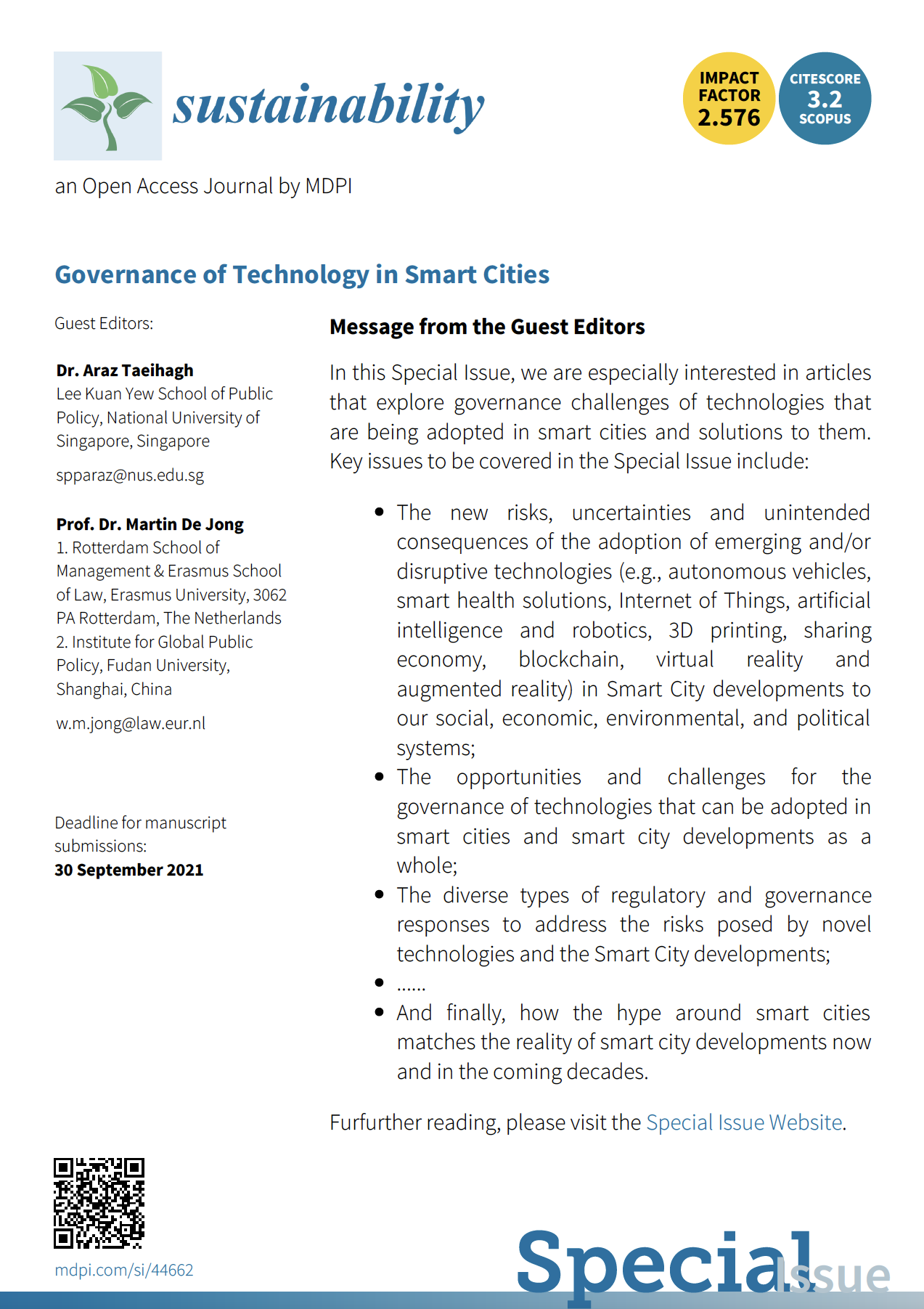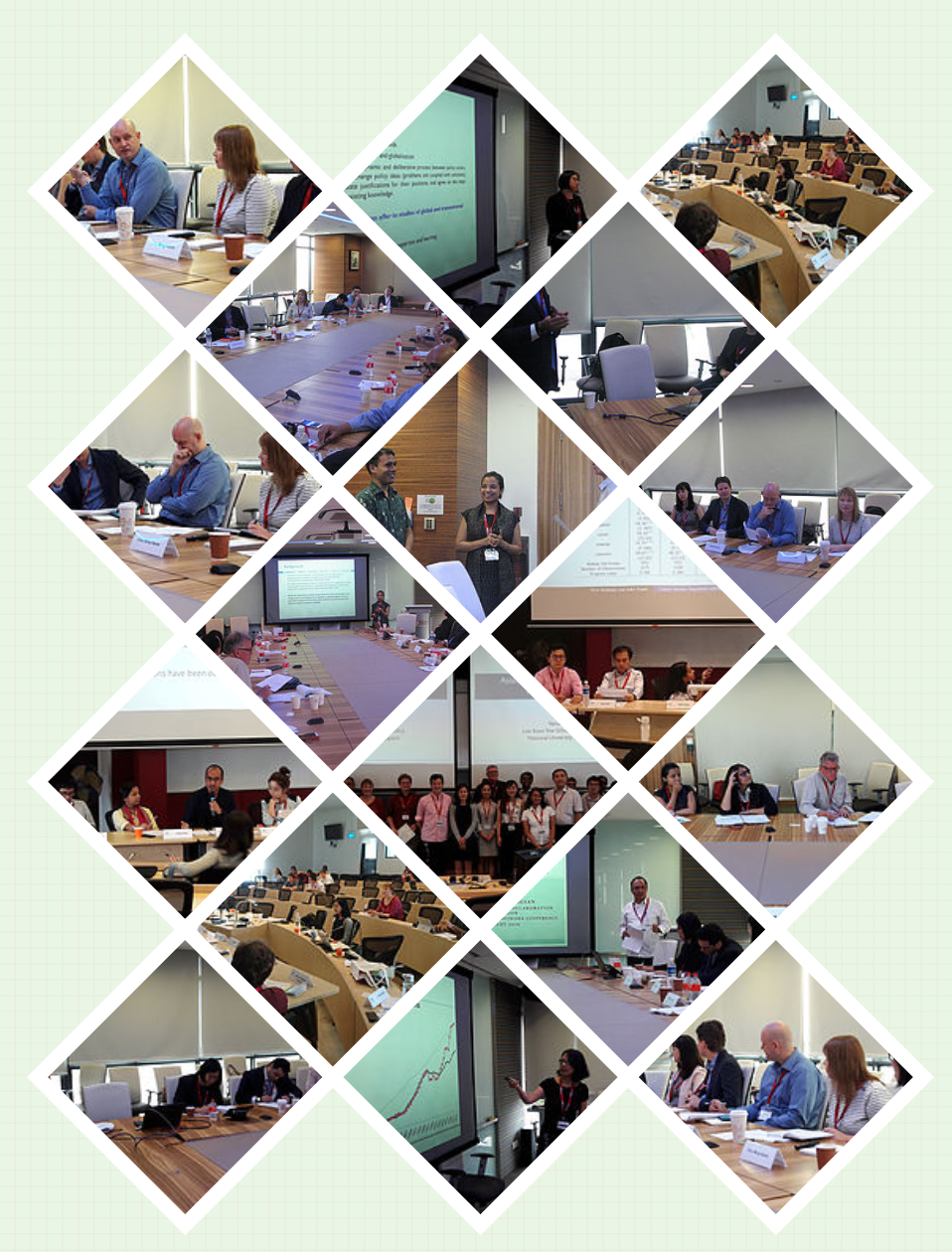CALL FOR PAPERS
T13P05 - PLATFORM GOVERNANCE IN TURBULENT TIMES
Abstract submission deadline: 31 January 2023
GENERAL OBJECTIVES, RESEARCH QUESTIONS AND SCIENTIFIC RELEVANCE
Platforms significantly increase the ease of interactions and transactions in our societies. Crowdsourcing and sharing economy platforms, for instance, enable interactions between various groups ranging from casual exchanges among friends and colleagues to the provision of goods, services, and employment opportunities (Taeihagh 2017a). Platforms can also facilitate civic engagements and allow public agencies to derive insights from a critical mass of citizens (Prpić et al. 2015; Taeihagh 2017b). More recently, governments have experimented with blockchain-enabled platforms in areas such as e-voting, digital identity and storing public records (Kshetri and Voas, 2018; Taş & Tanrıöver, 2020; Sullivan and Burger, 2019; Das et al., 2022).
How platforms are implemented and managed can introduce various risks. Platforms can diminish accountability, reduce individual job security, widen the digital divide and inequality, undermine privacy, and be manipulated (Taeihagh 2017a; Loukis et al. 2017; Hautamäki & Oksanen 2018; Ng and Taeihagh 2021). Data collected by platforms, how platforms conduct themselves, and the level of oversight they provide on the activities conducted within them by users, service providers, producers, employers, and advertisers have significant consequences ranging from privacy and ethical concerns to affecting outcomes of elections. Fake news on social media platforms has become a contentious public issue as social media platforms offer third parties various digital tools and strategies that allow them to spread disinformation to achieve self-serving economic and political interests and distort and polarise public opinion (Ng and Taeihagh 2021). The risks and threats of AI-curated and generated content, such as a Generative Pre-Trained Transformer (GPT-3) (Brown et al., 2020) and generative adversarial networks (GANs) are also on the rise (Goodfellow et al., 2014) while there are new emerging risks due to the adoption of blockchain technology such as security vulnerabilities, privacy concerns (Trump et al. 2018; Mattila & Seppälä 2018; Das et al. 2022).
The adoption of platforms was further accelerated by COVID-19, highlighting their governance challenges. The rise of misinformation and digital health technologies have created heated debates around trust and privacy on these platforms, and the term ‘misinfodemic’, though coined in 2018, is now used to refer to misinformation related to the pandemic (Marrelli, 2020). The US Sub-Committee on Antitrust, Commercial and Administrative Law recently released its report investigating competition in digital markets (US Antitrust Report, 2020). The report also finds that due to the absence of competition, dominant tech firms bear little financial consequence when misinformation is promoted online, and content moderation of unlawful and harmful content hosted on such platforms is an ongoing issue.
With this backdrop, countries worldwide have started looking into regulating technology platforms more seriously. This panel will present papers discussing the various dimensions of the use of digital platforms and their implications for policy-making.
CALL FOR PAPERS
This panel welcomes papers that explore the challenges of platform governance. Key research questions to be addressed are:
· Theoretical and empirical papers using various qualitative and quantitative approaches from disciplines that provide insights about the implications of the rapid adoption of these platforms and their effect on policy-making.
· The emerging theoretical, conceptual and empirical approaches to understanding new and unconventional regulatory approaches and governance strategies, as well as lessons learnt from the public and private organisations' standard-setting activities and development of guidelines for managing online platforms
· Theoretical, conceptual, or empirical studies that evaluate the effects of platforms on public service delivery and analyse how these platform activities affect the perceived political legitimacy of governments.
· Analysis of the roles of different actors in influencing policy outcomes through participation in platforms and at different stages of policy making.
· Analysis of the role of tech companies in addressing and/or exacerbating the governance challenges of platforms.
· Examining the different types of platform governance structures (e.g., in blockchain), their risks and unintended consequences, and the organisational, administrative, and institutional changes to accommodate these platforms.
· Cross-national and cross-sectoral studies and theoretically informed case studies examining different types of platforms (e.g., social media, blockchain, sharing economy, crowdsourcing) are especially welcome.
Abstract submission deadline (up to 500 words) 31 January 2023
REFERENCES
Brown, T., Mann, B., Ryder, N., Subbiah, M., Kaplan, J. D., Dhariwal, … Amodei, D. (2020). Language Models are Few-Shot Learners. Advances in Neural Information Processing Systems, 33.
Das, S., Rout, J., & Mishra, M. (2022). Blockchain Technology: Applications and Open Issues. In 2022 International Conference on Communication, Computing and Internet of Things (IC3IoT) (pp.1-6). IEEE.
Goodfellow, I. J., Pouget-Abadie, J., Mirza, M., Xu, B., Warde-Farley, D., Ozair, S., Courville, A., & Bengio, Y. (2014). Generative Adversarial Nets. Proceedings of the 27th International Conference on Neural Information Processing Systems – Vol(2):2672–2680.
Hautamäki, A., & Oksanen, K. (2018). Digital Platforms for Restructuring the Public Sector. In Collaborative Value Co-creation in the Platform Economy (pp.91-108). Springer, Singapore.
Kshetri, N., & Voas, J. (2018). Blockchain-enabled e-voting. Ieee Software, 35(4):95-99.
Loukis, E., Charalabidis, Y., & Androutsopoulou, A. (2017). Promoting open innovation in the public sector through social media monitoring. Government Information Quarterly, 34(1):99-109.
Marrelli, M. (2020). Exploring COVID-19 in Emerging Economies: Announcing the 2020 Global Misinfodemic Report. Meedan
Mattila, J., & Seppälä, T. (2018). Distributed Governance in Multi-sided Platforms: A Conceptual Framework from Case: Bitcoin. In Collaborative Value Co-creation in the Platform Economy (pp.183-205). Springer, Singapore.
Ng, L. H., & Taeihagh, A. (2021). How does fake news spread? Understanding pathways of disinformation spread through APIs. Policy & Internet, 13(4):560-585.
Prpić, J., Taeihagh, A., & Melton, J. (2015). The fundamentals of policy crowdsourcing. Policy & Internet, 7(3):340-361.
Sullivan, C., & Burger, E. (2019). Blockchain, digital identity, e-government. In Business Transformation through Blockchain (pp.233-258). Palgrave Macmillan, Cham.
Taeihagh, A. (2017a). Crowdsourcing, Sharing Economies and Development, Journal of Developing Societies, Vol 33(2):191–222.
Taeihagh, A. (2017b). Crowdsourcing: a new tool for policy-making? Policy Sciences Journal, 50(4):629-647
Taş, R., & Tanrıöver, Ö. Ö. (2020). A systematic review of challenges and opportunities of blockchain for E-voting. Symmetry, 12(8):1328.
Trump, B. D., Wells, E., Trump, J., & Linkov, I. (2018). Cryptocurrency: Governance for what was meant to be ungovernable. Environment Systems and Decisions, 38(3):426-430.
US Subcommittee on Antitrust, Commercial and Administrative Law (2020). Investigation of Competition in Digital Markets. Majority Staff Report and Recommendations.








